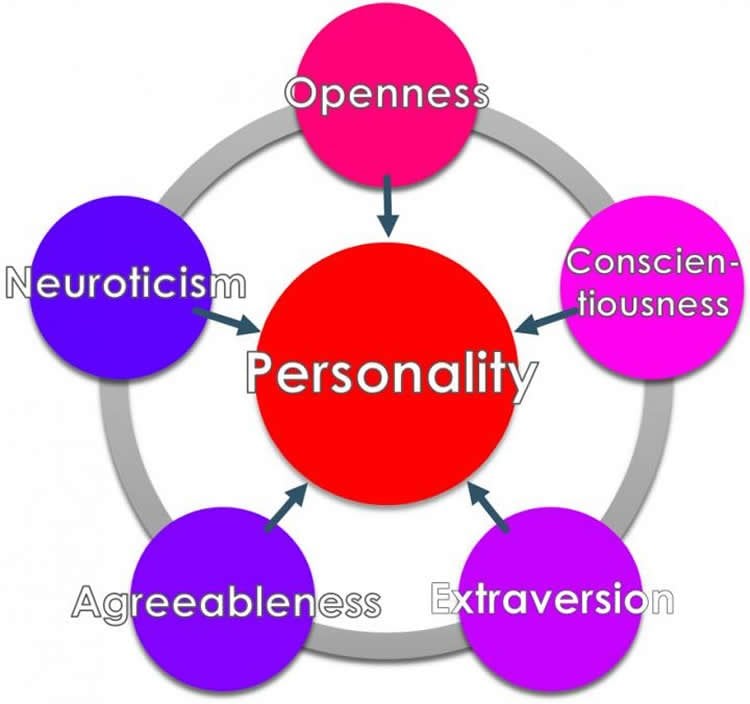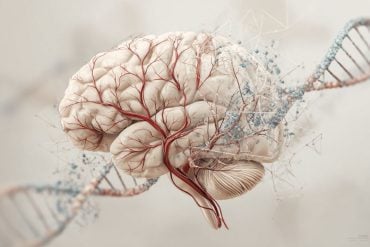Summary: According to researchers, having high levels of neuroticism may put people at higher risk of mood disorders. However, if the person is also extroverted or conscientious, the combined personality traits may act as a buffer against depression and anxiety.
Source: University at Buffalo.
Though high levels of neuroticism put people at risk for depression and anxiety, if those same individuals are also highly extraverted and conscientious they could have a measure of protection against those disorders, according to the results of a new study by a team of University at Buffalo psychologists.
The findings, published in the Journal of Research in Personality, point to the importance of stepping away from focusing on single personality traits in clinical settings in favor of looking at how combinations of traits might work together to help either prevent or predict specific symptoms.
“We know individually how these traits relate to symptoms, but now we are beginning to understand how the traits might impact one another,” says Kristin Naragon-Gainey, an assistant professor in UB’s Department of Psychology and the paper’s lead author with Leonard Simms, associate professor of psychology.
“We have to consider the whole person in order to understand the likelihood of developing negative symptoms down the road.”
Neuroticism is the tendency to experience different negative emotions and to react strongly to stress. Along with extraversion and conscientiousness, it is among the “Big Five” personality traits, a group that also includes agreeableness and openness to experience.
People express each of the traits somewhere on a continuum. Someone high in extraversion would be very social, while another person low in extraversion would be much less outgoing. Conscientiousness, meantime, is the tendency to be organized, goal-oriented and non-impulsive.
The researchers interviewed 463 adult participants who reported receiving psychiatric treatment within the past two years. Each participant also completed numerous questionnaires. The study examined the traits of neuroticism, extraversion and conscientiousness because those three have the strongest associations with mood and anxiety disorders.
Naragon-Gainey says all things being equal, there are risks for disorders associated with certain traits, but a better image of what’s at stake emerges when there’s an understanding of how a group of behavioral tendencies might work together.
The results could provide an improved understanding of the mechanisms through which people develop mood disorders and explain the factors that might put someone at risk for symptoms like depression and anxiety.
Additionally, the findings might assist clinicians in how to capitalize on people’s strengths with treatments that utilize what the study’s results suggest are protective traits.

“I think there’s a tendency in treatment and clinical psychology to concentrate on the problems and the negatives,” says Naragon-Gainey. “If you utilize the pre-existing strengths that clients bring with them, it can positively affect treatment and the level of symptoms going forward, as well as reinforcing what the person is already doing well.”
Conceptually, the strengths linked to high levels of extraversion and conscientiousness relate to the fact that social interactions and effective engagement in meaningful activities are rewarding for people, according to Naragon-Gainey.
“If someone has high levels of extraversion they might be very good at gathering social support or increasing their positive affectivity through social means,” says Naragon-Gainey. “Similarly, conscientiousness has a lot to do with striving toward goals and putting plans in action, which can combat the withdrawal and avoidance that can go along with neuroticism.”
Source: Bert Gambini – University at Buffalo
Publisher: Organized by NeuroscienceNews.com.
Image Source: NeuroscienceNews.com image is credited to Eganos – Own work, CC BY-SA 4.0.
Original Research: Abstract for “Three-way interaction of neuroticism, extraversion, and conscientiousness in the internalizing disorders: Evidence of disorder specificity in a psychiatric sample” by Kristin Naragon-Gainey and Leonard J. Simms in Journal of Research in Personality. Published online October 2017 doi:10.1016/j.jrp.2017.05.003
[cbtabs][cbtab title=”MLA”]University at Buffalo “Combinations of Certain Personality Traits May Guard Against Anxiety and Depression.” NeuroscienceNews. NeuroscienceNews, 29 November 2017.
<https://neurosciencenews.com/personality-traits-depression-anxiety-8056/>.[/cbtab][cbtab title=”APA”]University at Buffalo (2017, November 29). Combinations of Certain Personality Traits May Guard Against Anxiety and Depression. NeuroscienceNews. Retrieved November 29, 2017 from https://neurosciencenews.com/personality-traits-depression-anxiety-8056/[/cbtab][cbtab title=”Chicago”]University at Buffalo “Combinations of Certain Personality Traits May Guard Against Anxiety and Depression.” https://neurosciencenews.com/personality-traits-depression-anxiety-8056/ (accessed November 29, 2017).[/cbtab][/cbtabs]
Abstract
Three-way interaction of neuroticism, extraversion, and conscientiousness in the internalizing disorders: Evidence of disorder specificity in a psychiatric sample
It is well-established that neuroticism, extraversion, and conscientiousness are individually associated with internalizing disorders, but research suggests that these main effects may be qualified by a three-way interaction when predicting depression. The current study was the first to examine this three-way interaction in a psychiatric sample (N = 463) with a range of internalizing symptoms as the outcomes. Using two omnibus personality inventories and a diagnostic interview, the expected three-way interaction emerged most consistently for symptoms of major depression, and there was also evidence of synergistic effects for post-traumatic stress disorder and generalized anxiety disorder. Findings indicate that, even in a clinically-distressed and currently-disordered sample, high levels of extraversion and conscientiousness protect against distress disorders for those with high levels of neuroticism.
“Three-way interaction of neuroticism, extraversion, and conscientiousness in the internalizing disorders: Evidence of disorder specificity in a psychiatric sample” by Kristin Naragon-Gainey and Leonard J. Simms in Journal of Research in Personality. Published online October 2017 doi:10.1016/j.jrp.2017.05.003






